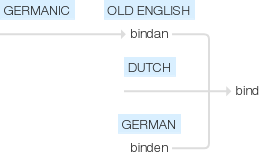Bind
Old English bindan, of Germanic origin; related to Dutch and German binden, from an Indo-European root shared by Sanskrit bandh .
wiktionary
From Middle English binden, from Old English bindan, from Proto-West Germanic *bindan, from Proto-Germanic *bindaną (compare West Frisian bine, Dutch binden, Low German binnen, German binden, Danish binde), from Proto-Indo-European*bʰéndʰ-e-ti, from *bʰendʰ-(“to tie”)
Compare Welsh benn(“cart”), Latin offendīx(“knot, band”), Lithuanian beñdras(“partner”), Albanian bend(“servant, henchman”), Ancient Greek πεῖσμα(peîsma, “cable, rope”), Persian بستن (bastan, “to bind”), Sanskrit बन्धति(bándhati). Doublet of bandana.
etymonline
bind (v.)
Old English bindan "to tie up with bonds" (literally and figuratively), also "to make captive; to cover with dressings and bandages" (class III strong verb; past tense band, past participle bunden), from Proto-Germanic *bindanan (source also of Old Saxon bindan, Old Norse and Old Frisian binda, Old High German binten "to bind," German binden, Gothic bindan), from PIE root *bhendh- "to bind." Of books, from c. 1400. Intransitive sense of "stick together, cohere" is from 1670s.
bind (n.)
"anything that binds," in various senses, late Old English, from bind (v.). Meaning "tight or awkward situation" is from 1851.
